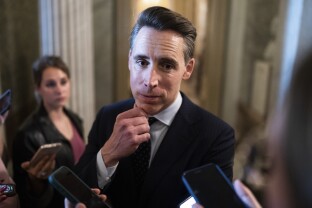As the Senate kicks off a marathon day of voting on the “big, beautiful bill,” there are still plenty of outstanding issues that need to be addressed before the bill can pass.
“My view is that we don’t balance the budget by taking health care from working people,” Sen. Josh Hawley, a former holdout on the bill who has now voiced support for it, told reporters on Sunday. “Want to balance the budget? Why don’t we close the carried interest loophole, or why don’t we do what the president has said and allow the top tax rate to rise for millionaires?”
Senate Republicans over the weekend managed to get their bill through a grueling motion-to-proceed vote that succeeded after hours of negotiations convinced several Republicans to move the bill forward, including Sen. Ron Johnson, a holdout who flipped his vote from “no” to “yes.” But that was just the start of their to-do list on the floor.
Senate Democrats then forced the clerk to read the entirety of the 940-page bill, insisting Americans should hear what’s in it, which took just under 16 hours. Lawmakers debated for hours following the reading before concluding late Sunday night.
Senators could have begun the so-called vote-a-rama immediately after concluding debate, but opted to reconvene at 9 a.m. on Monday instead. While that gave senators and staff an overnight break, it does push back the likely time for final passage. There’s no exact time when the vote-a-rama is expected to end, but most Senate watchers are expecting a final vote to take place sometime late Monday or very early Tuesday.
Democrats are planning to target their amendments toward health care cuts and tax cuts for the wealthy — two areas the party feels confident about in their messaging. They will also offer amendments on rural hospitals and food assistance programs, though none of their proposals are expected to pass.
Republicans, meanwhile, are likely to have at least some heated votes in the next few hours.
Sen. Rick Scott, one of the fiscal conservatives who wants to see more spending cuts in the bill, will reportedly introduce an amendment that would lower the federal cost share for newly eligible Medicaid enrollees from 90% to as low as 50%. That measure has the support of four other Republicans: Sens. Ron Johnson, Cynthia Lummis, Mike Lee, and Mike Crapo.
Even Majority Leader John Thune voiced support for the Scott amendment, reportedly calling it “really good policy.”
But others, including Sens. Susan Collins and Hawley, have remained strongly opposed to any such changes to the federal cost share for Medicaid. They supported the motion to proceed, since the bill contained a fund for rural hospitals and a delay on lowering the provider tax for hospitals. But Hawley was adamant on Sunday, despite his “yes” vote to proceed, that he was still against the Medicaid cuts in the bill and would aim to prevent them from becoming a reality. (He has also said he would vote “yes” on the final bill.)
“We have to prevent those future Medicaid cuts from going into effect,” Hawley told reporters Saturday. “We’ve delayed them, but we have to deny them.”
He’s not likely to support further cuts, like the Scott amendment. Meanwhile, Collins will try to double the rural hospital fund and return taxes on people earning $25 million to $50 million to the pre-2017 rate.
Sen. Lisa Murkowski may be another difficult vote to wrangle, as a package of carve-outs for her state of Alaska was struck down by the Senate parliamentarian Sunday for not abiding by budgetary rules. She voted “yes” on the motion to proceed, but is now seeking an amendment to ease phase-outs of some clean energy tax credits.
Another one of the more hotly contested parts of the bill — a 10-year moratorium on states self-regulating artificial intelligence — appears to have been worked out.
Sens. Ted Cruz and Marsha Blackburn have reportedly reached a deal to tamp down the provision to a five-year moratorium, seemingly curbing Blackburn’s plan to offer an amendment to strip the proposal out altogether.
Senate Republicans on Monday morning also voted 53-47 to consider the bill’s tax proposals as “current policy baseline” — a wonky characterization that’s allowed Republicans to argue their tax cuts won’t cost any additional money, because they’re simply an extension of existing tax cuts.
When all is said and done, the Senate will likely pass the bill and send it to the House.
House leadership told members to return at 9 a.m. Wednesday. There are still plenty of Republicans there who have concerns about the Senate’s bill as is, so it remains to be seen whether the amended version that ultimately passes the Senate will have a smooth path to passage in the House.
—
Helen Huiskes is a NOTUS reporter and an Allbritton Journalism Institute fellow. Ursula Perano, a reporter at NOTUS, contributed to this report.
Sign in
Log into your free account with your email. Don’t have one?
Check your email for a one-time code.
We sent a 4-digit code to . Enter the pin to confirm your account.
New code will be available in 1:00
Let’s try this again.
We encountered an error with the passcode sent to . Please reenter your email.


